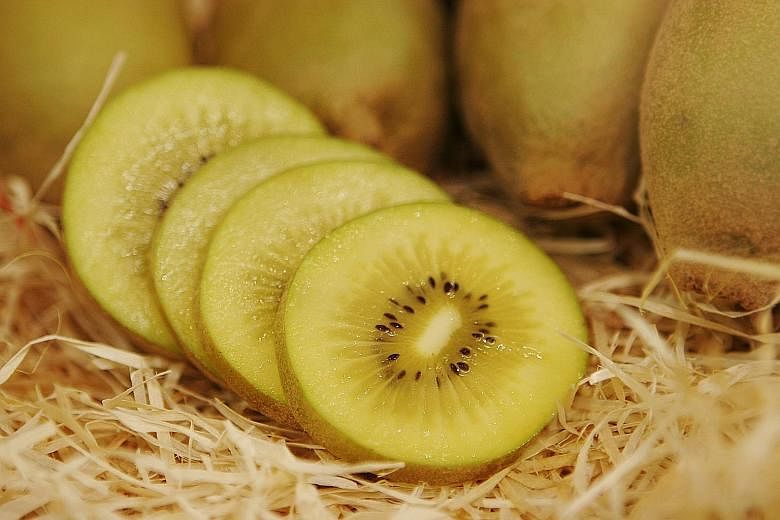One of the most common foods in the world - bread - can be poison to some people, if it contains wheat that they are allergic to.
Kiwi fruit is another example of a well-known food item that some people can be allergic to.
Eating a kiwi fruit can occasionally lead to tongue irritation, but the discomfort should resolve after a few hours.
"However, some patients can have prolonged and severe symptoms after eating a small amount of kiwi fruit," said Dr Chong Yong Yeow, a specialist in rheumatology and consultant at Raffles Internal Medicine Centre.
Such symptoms include tingling or swelling of the tongue, nausea and abdominal cramps. Those who have trouble breathing should get medical help, said Dr Chong.
As kiwi fruit is more commonly used now - it is also used as toppings for fruit cakes, in fruit juices and smoothies as well as incorporated into cookies - those who are allergic to it have to be vigilant, he said. They may also react to latex, avocados, bananas, apples and carrots.
Said Dr Adrian Chan, a consultant at the department of respiratory and critical care medicine at Singapore General Hospital: "Some proteins in latex are similar to food proteins, such as those in banana, kiwi and pineapple. People with latex allergy may also have cross-reactions to these foods."
Someone with a pollen allergy could also get mouth and tongue irritation from eating kiwi fruit.
This is called pollen-food allergy syndrome and it is postulated to be linked to similarities between allergens in pollen and kiwi.
Meanwhile, wheat allergy mostly affects children, though about 65 per cent outgrow it by the time they are teenagers, said Dr Chong.
People with this allergy are advised to avoid wheat but this can be quite challenging as it is found in a wide range of foods, he added.
However, wheat allergy should not be confused with gluten sensitivity. People with celiac's disease would avoid gluten, which is found in wheat, rye and barley.
"Unlike those with gluten sensiti- vity (also known as celiac disease), a person who has been diagnosed with wheat allergy must avoid eating food containing wheat as they can be prone to severe reactions," said Dr Chong.
Wheat is also known to trigger food-dependent, exercise-induced anaphylaxis.
Those with this variation of the allergy can eat food containing wheat, provided they do not physically exert themselves within four to six hours, said Dr Chong.
An allergen that affects about two people here each year is galacto- oligosaccharide (GOS), a carbohydrate added as a prebiotic to commercial milk formula to promote the growth of good bacteria in the gut.
Dr Elizabeth Tham, an associate consultant at the division of paediatric allergy, immunology and rheumatology at National University Hospital, said a man found out he had an allergy only when he took a sip of milk formula containing GOS that he had prepared for his child.
He developed hives, swelling on the face and an itch in the throat within five minutes of consuming the milk formula, she said.
A Health Ministry release on this allergy last year said that since 2007, about two cases of GOS allergies have been reported each year in Singapore. To date, there are no reported cases of infants below the age of two who are allergic to this substance.
Those who have had allergic reactions developed swelling in the eyes and lips, throat tightness, hives, cough or wheezing after their first exposure to GOS, said Dr Tham.
People who encounter adverse effects after consuming a GOS- containing product should seek medical attention immediately.
Added Dr Tham: "They should not continue to expose themselves to the allergen to let their body 'get used to it'. This may induce more severe, life-threatening reactions."
Joyce Teo



